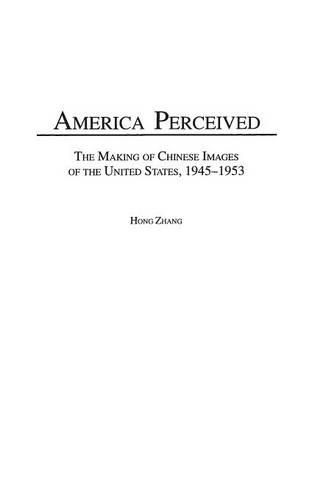
America Perceived: The Making of Chinese Images of the United States, 1945-1953
(Hardback)
Publishing Details
America Perceived: The Making of Chinese Images of the United States, 1945-1953
By (Author) Hong Zhang
Bloomsbury Publishing PLC
Praeger Publishers Inc
30th May 2002
United States
Classifications
Tertiary Education
Non Fiction
International relations
History of the Americas
Asian history
327.51073
Physical Properties
Hardback
232
Description
Places the shifting perceptions of the United States among a significant political group--young, volatile, and politically active urban Chinese--into historical perspective through the examination of the origin, development, and eruption of their anti-American sentiments. While American images of China have been characterized by a fluctuating "love/hate" relationship, many educated urban Chinese youths also retained ambivalent feelings toward the United States in the early decades of the 20th century. The years between the end of the Second World War and the outbreak of the Korean War represented a significant period in Sino-American relations. This study places the shifting perceptions of the United States among an important political group--young, volatile, and politically active urban Chinese--into historical perspective through the examination of the origin, development, and eruption of their anti-American sentiment. These feelings would prove to be a liability to the Chinese Nationalist cause and would ultimately assist in easing the way of the Communists into urban China. In the immediate post-World War II period, American influence and presence in China reached an unprecedented peak. However, American political, military, and economic activities largely failed to generate Chinese good will; instead, such actions produced political antipathy toward the United States. The sojourn of American GIs in urban China, for example, would serve as a critical factor in arousing nationalist fervor. The Chinese Communist Party would capitalize on this groundswell and push it to the foreground during open hostilities with the United States after the outbreak of the Korean War.
Reviews
Americans have usually thought that China should view the US as its friend in the world. However, Zhang persuasively explains why young urban Chinese intellectuals, who harbored ambivalent feelings of both admiration and resentment, ultimately were to be disenchanted with the US. First of all, the stationing of US military personnel in China after WW II led to numerous conflicts with local Chinese. Second, in hoping to prevent a civil war between the Chinese Communists and Nationalists, Henry Wallace, Patrick Hurley, and General George Marshall tried to mediate with the two sides. However, their efforts were compromised from the start, as many Chinese intellectuals saw the US as biased in favor of the Nationalists under Chiang Kai-shek. Then, in 1946-47, anti-American feeling intensified when a GI raped Shen Chong (a young student from National Beijing University) but escaped punishment because officials in Washington reversed the verdict. Finally, US support for the economic reconstruction of Japan and US intervention in the Korean War further alienated Chinese intellectuals. A well-documented and illuminating study, suitable for a general audience. All collections.-Choice
In this impressively researched book, Hong Zhang demonstrates how quickly gratitude to liberators can change to hostility when liberators are perceived as oppressive.-The Journal of American History
"In this impressively researched book, Hong Zhang demonstrates how quickly gratitude to liberators can change to hostility when liberators are perceived as oppressive."-The Journal of American History
"Americans have usually thought that China should view the US as its friend in the world. However, Zhang persuasively explains why young urban Chinese intellectuals, who harbored ambivalent feelings of both admiration and resentment, ultimately were to be disenchanted with the US. First of all, the stationing of US military personnel in China after WW II led to numerous conflicts with local Chinese. Second, in hoping to prevent a civil war between the Chinese Communists and Nationalists, Henry Wallace, Patrick Hurley, and General George Marshall tried to mediate with the two sides. However, their efforts were compromised from the start, as many Chinese intellectuals saw the US as biased in favor of the Nationalists under Chiang Kai-shek. Then, in 1946-47, anti-American feeling intensified when a GI raped Shen Chong (a young student from National Beijing University) but escaped punishment because officials in Washington reversed the verdict. Finally, US support for the economic reconstruction of Japan and US intervention in the Korean War further alienated Chinese intellectuals. A well-documented and illuminating study, suitable for a general audience. All collections."-Choice
Author Bio
HONG ZHANG is Assistant Professor of History at the University of Central Florida. Since obtaining degrees at Nankai University and the University of Arizona, she has had articles published in The Journal of American-East Asian Relations and Chinese Historians.
